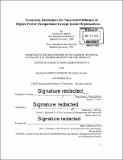Ecosystem disclaimers for successful influence of higher power occupational groups inside organizations
Author(s)
Jackson, Summer R.
Download1126277316-MIT.pdf (3.254Mb)
Other Contributors
Sloan School of Management.
Advisor
Katherine C. Kellogg.
Terms of use
Metadata
Show full item recordAbstract
We use data from a two-year comparative ethnographic field study of public defenders in two offices to examine how lower power occupation members are able to influence higher power occupation members, which the literature on work and occupations has shown to be difficult. Lower power public defenders in both offices faced the same barriers to influence of higher power prosecutors and had access to the same contextual facilitators of influence. Yet, public defenders from one office influenced prosecutors at a higher rate than they did in the other. Our paper demonstrates how "ecosystem disclaimers"-activities that allow lower power occupational group members to demonstrate their commitment to third party audiences before engaging in influence tactics with a more powerful occupational group that could be negatively misinterpreted by these audiences-can facilitate lower power occupational group influence. This paper contributes to the literature on work and occupations by incorporating the importance of a general community of others' whose impression of upward influence must also be managed.
Description
Thesis: S.M. in Management Research, Massachusetts Institute of Technology, Sloan School of Management, 2018 Cataloged from PDF version of thesis. Includes bibliographical references (pages 26-28).
Date issued
2018Department
Sloan School of ManagementPublisher
Massachusetts Institute of Technology
Keywords
Sloan School of Management.